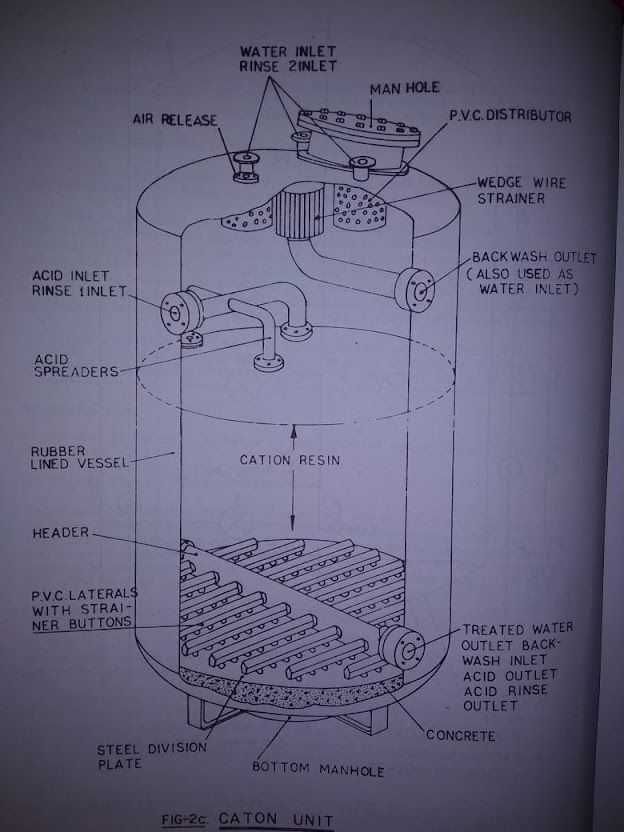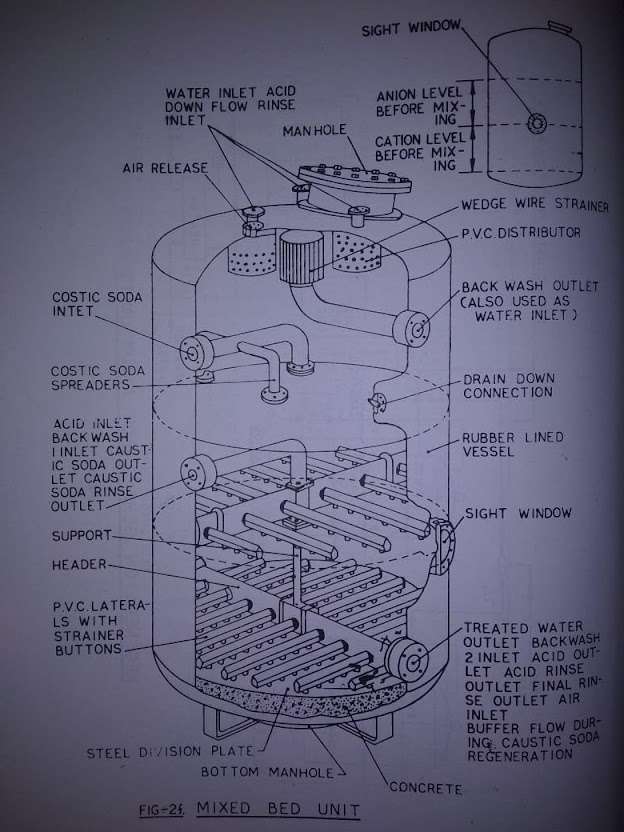WATER TREATMENT
What is water
Water is the combination of two molecule of
hydrogen and one molecule of oxygen.
2H2+O → H2O
In a thermal power plant main sources
is water so it can must be required
to plenty amount for produced electricity through steam flowing to steam
turbine.
So that the raw water is carried
out from river ,sea , kennel etc. This
raw water contain some impurities to remove those impurity water treatment
plant must be required.(the impurity
are salt and mineral, Organic material,
Biological ,Oil and grease, Floating solid, Colloids, Colour , Order, Suspended
solids etc).
Process of making DM water from
raw water in WTP
In
water treatment plant raw water is carried out from river,lakes,sea etc.These
raw water contains impurity like large material
which is removed through mesh,The process of removed large particle
material is called Screening.
After screening the raw
water is storage a large sourrounded area where remove some bacteria by
mixing of chlorine in water in ths
process is called Areation.
After aeration process
complete we get a clarify water through clarification by filter is called
Pre-treatment of WTP. It involves Coagulation, Floculation after that clarifier
used to remove sludge in water through pressure filter.
After clarification active
carbon filter is used as a filter bed
through which water is passed .it main function is to activate carbon by
oxidation of water by free of chlorine .in active carbon filter a membrane filter is used to removed non-reactive
silica.
After removing silica through
active carbon filter we make DM water by post-treatment through Anion exchange
resin, Cation exchange resin, Mix bed unit ,after cat ion exchange the influent acid and all
the bicarbonate present in water which convert CO2 .This CO2 is removed through
degasser through degasser pimp otherwise co2 is removed in anion exchange
method .and De-Mineralised water is prepare to formation of Steam.
Why DM water is used formation of steam not in raw water
Because DM water does not contain any
impurities which is suitable for produced steam. If we use raw water it contain
impurities like silica when the raw water is feed to boiler the silica is
deposited on boiler water wall tube which reduced heat transfer and silica
deposited inner surface of tube which occurred Scaling.
Method of treatment of
water in WTP
Two type of method
used in water treatment plant
1> Pre-Treatment
This method is used to avoid
corrosion in boiler tube
silica, colloids, suspended solids,
organic mater, bacteria,
physically mixed, floating solid etc
removed in pre treatment plant
2>Post-treatment
Post treatment is used to remove
dissolve gasses and solid to make DM water
1-PRE-TREATMENTPLANT
 |
Pre treatment is used to remove suspended solids, colloids, organic matter etc. Process of removing those things steps are below given.
Ø Screening
Screening is provide to avoid large size
floating material comes from with water from river.the screening are 25mm dia
hole and are spaces about 100mm apart and placed slightly inclination from
vertically which is easy to remove large particle,here velocity of water should
not exceed 0.5m/s. After screening a fine screen fitted through orifice in size
of 6mm dia to removeparticle in size of 6mm dia to remove particle are also
called travelling water screens.
Ø Raw water storage
After screen the raw material is storage
large surrounded area at 7 to 15 days
for improvement of water quality and average water demand and also reduced bacteria, suspended solids and river algae etc.
Ø Prechlorination
This process chlorine
is injected into raw water for destroys the high bacteria ,oxidizes, iron and
manganese are kill algae ,reduces colour etc.
Ø Aeration
The process is used to controlling taste,
order, and Corrosion but not all case complete control gases are absorbed or
liberated from water between natural gas contain in atmosphere and gas contain
in water , the volatile matter and decomposing organic matter can be manganese
in solution are also oxidized and precipitated out.
Ø Coagulation
This process small
particle suspension together to from large agglomerate. Fine particles and
colloids are present in water which carry negative charges on their surface
which are true coagulation into a large particle which depend upon frequency of
collision. So it is very important process to accelerate sedimentation of
suspended particles coagulation aids is
different type which are all long chain molecules carrying electrically active
group like long chain poly acrylic amides which carries positive charges.
Ø Flocculation
When ferric and aluminium
salts added into water is formed insoluble hydroxide which comes out as flocks
whose surface carry positive flocks attracts itself with the negative charged
particles in water and also attracts and holds humic acid. When alums added in
water aluminium hydroxide floc and sulphuric acid is reduced PH value of water
normally raw water PH is alkaline, after addition of alum in water PH value may
be down to coagulation pit. In rainy season when turbidity is high , alum
dosing is high in that case PH may faill below coagulation PH. So Lime ca(OH2) is
used to increase PH to required level & helps to remove some hardness.
Ø Clarifiers
This system which water is cleared form most
of the suspended solids with or without coagulation then there is different types
of clarifiers.
1>Conventional type
2>Hopper to remove sludge - it is used to remove sludge
Ø Filteration
Filtration means removing suspended solid out
of fluids and colloids from water. in case of filtration no sands and mud are
not filtration here water which has been
screened and settled which contained
suspended matter and colloids .colloids are those particles which does not show
in microscope which size is 0.005 to 0.2 microns in diameter. The colloids is
water absorb and scatter light passing through it this process remove suspended
solids in water.
1>Deep
bed filter
It
is used to removed sand always back washed
upward and san bed expand and solids are released
It is 2 type
-Up flow filter
-Down flow
filter
2>Slow and rapid sand filter
Its flow is 1-2kg /sqft/hr and
100litr/sq-m/hr
3>Activated
carbon filter
It is used to remove bacteria growth it main function is oxidisation of
water by free chlorine.
4>Membrane filter
A Ultra filtration membranes used to remove
non-reactive silica with a pressure of 5 bar water have total dissolve salts or
more than 500 ppm.
2 POST TREATMENT
Post treatment is used in DM plant
maded ehich is 3 type of process.
a) Ion exchange method
b)chemical softonic method
c)Reverse osmosis method
Ø ION EXCHANGE METHOD
In this method includes anion exchange resin and cation exchange reign for removing dissolve solid
Cat ion exchange method
Cat
ion is positive charge but in acid which represent H+ and its resin is R+ it is two type
1. Strong acid cation exchange
When the function group
attached to resin matrix is strong acid
group is called SAC resin. It split all salts and influence by PH of water its operational exchange capacity
and regeneration efficiency of SAC is less than WAC.
2.Weak acid cation exchange
When the
functional group is of weak acid is called WAC resin it can spited weak
electrolyte carbonate and bicarbonate only.
Anion exchange method
It can denoted
OH- and negative charge it is two
type
1.Strong base anion resin
Strong Based anion the functional group is strong base is called
SBA.it
performance is not influenced by water PH
and it exchange with both strong and weak acids.
2.Weak base Anion Exchange
When the functional group attracted to
weak base is called week base anion. It performance better at low PH and
increase PH decreased it performance when PH more than 11
efficiency
SAB<WBA
Mixed bed unit
This method
both anion and cation exchanger passing through water mixed bed unit is formed
and after mix bed unit DM water is made.
DEGASSIFIER
After
the cation exchanger the influent is acid and all the bicarbonate present in
water is converted to co2 , this co2 can
remove in degasser ,the capital cost of degasser is very less and running cost
also less. other wise co2 is remove in
anion exchanger. The theory of degasser based on following gas law.
DALTONS LAW
The total pressure exerted by a
mixture of several gases to the sum of the partial pressure of individual gas.
Again according to charls law the partial pressure of each gas is determined by
the amount of that gas in the mixture.
HENRYS
LAW
The solubility of the gas in water is directly proportional to the partial
pressure or that gas is contact with water.
X =
P/H
Where X= Amount of gas dissolved in water
P=Partial pressure of the gas in
contact with water
H= Constant at that
temperature
















